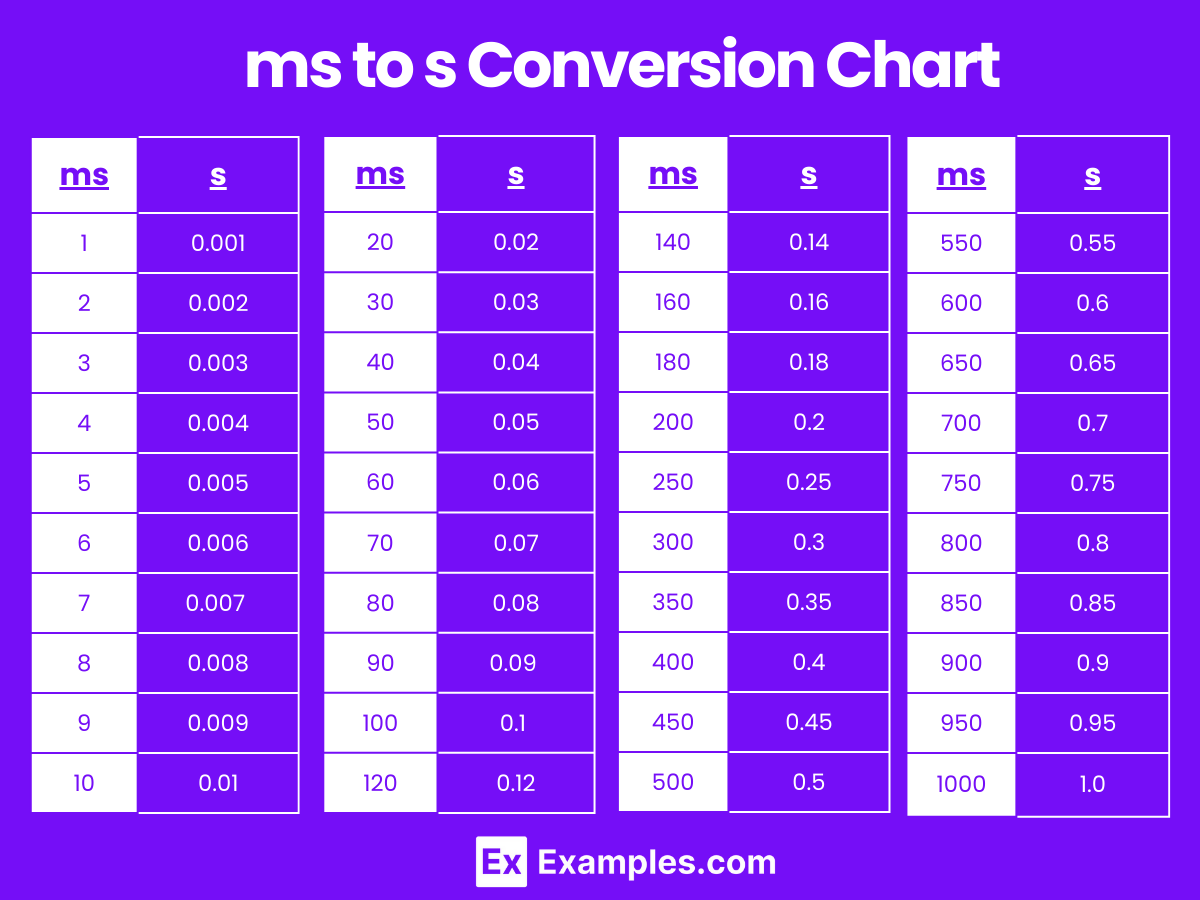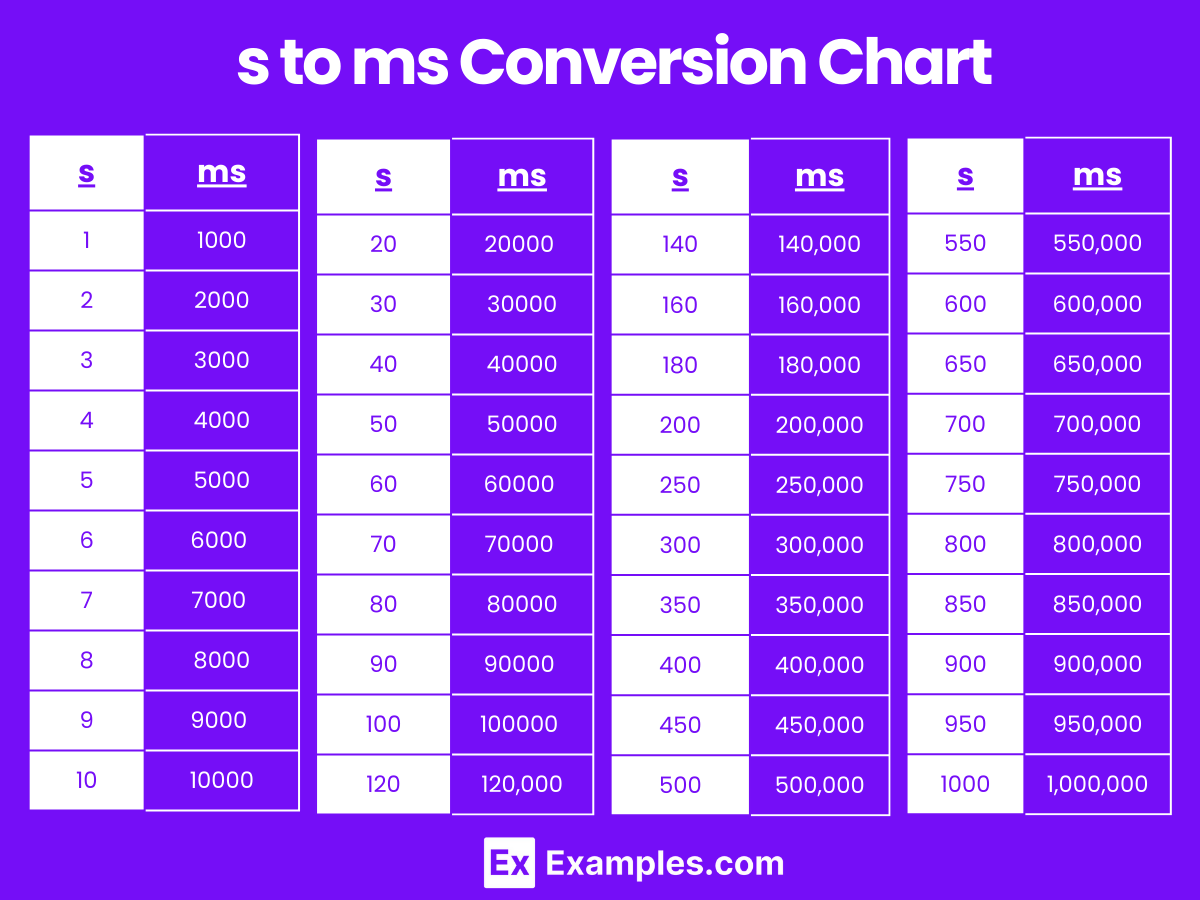Quickly convert milliseconds to seconds and vice versa at Examples.com. Just provide your data for fast and precise outcomes.
ms to s
Formula: Time in seconds(s) = Time in milliseconds(ms) ∕ 1000
Milliseconds :
Seconds :
| milliseconds | seconds |
|---|---|
| 1 | 0.001 |
s to ms
Formula: Time in milliseconds(ms) = Time in seconds(s)x 1000
Seconds :
Milliseconds :
| seconds | milliseconds |
|---|---|
| 1 | 1000 |
Time Converters to Millisecond (mm)
Time Converters to Second (s)
| Nanosecond to Second | Microsecond to Second | Millisecond to Second |
| Minute to Second | Hour to Second | Day to Second |
| Week to Second | Month to Second | Calendar Year to Second |
| Decade to Second | Century to Second |
Conversion Factors:
- Milliseconds to Seconds: 1 second = 1000 milliseconds
- Seconds to Milliseconds: 1 millisecond = 1/1000 seconds
How to Convert Milliseconds to Seconds:
To convert milliseconds to seconds, divide the number of milliseconds by 1000.
Seconds=Milliseconds/1000
Example:
Convert 2000 milliseconds to seconds.
Seconds=2000/1000=2 seconds
How to Convert Seconds to Milliseconds:
To convert seconds to milliseconds, multiply the number of seconds by 1000.
Milliseconds=Seconds×1000
Example:
Convert 3 seconds to milliseconds.
Milliseconds=3×1000=3000 milliseconds
Milliseconds to Seconds Conversion Table
| Milliseconds (ms) | Seconds (s) |
|---|---|
| 1 ms | 0.001 s |
| 2 ms | 0.002 s |
| 3 ms | 0.003 s |
| 4 ms | 0.004 s |
| 5 ms | 0.005 s |
| 6 ms | 0.006 s |
| 7 ms | 0.007 s |
| 8 ms | 0.008 s |
| 9 ms | 0.009 s |
| 10 ms | 0.01 s |
| 20 ms | 0.02 s |
| 30 ms | 0.03 s |
| 40 ms | 0.04 s |
| 50 ms | 0.05 s |
| 60 ms | 0.06 s |
| 70 ms | 0.07 s |
| 80 ms | 0.08 s |
| 90 ms | 0.09 s |
| 100 ms | 0.1 s |
ms to s Conversion Chart

Seconds to Milliseconds Conversion Table
| Seconds (s) | Milliseconds (ms) |
|---|---|
| 1 s | 1000 ms |
| 2 s | 2000 ms |
| 3 s | 3000 ms |
| 4 s | 4000 ms |
| 5 s | 5000 ms |
| 6 s | 6000 ms |
| 7 s | 7000 ms |
| 8 s | 8000 ms |
| 9 s | 9000 ms |
| 10 s | 10000 ms |
| 20 s | 20000 ms |
| 30 s | 30000 ms |
| 40 s | 40000 ms |
| 50 s | 50000 ms |
| 60 s | 60000 ms |
| 70 s | 70000 ms |
| 80 s | 80000 ms |
| 90 s | 90000 ms |
| 100 s | 100000 ms |
s to ms Conversion Chart

Difference Between Milliseconds to Seconds
| Aspect | Milliseconds (ms) | Seconds (s) |
|---|---|---|
| Definition | A millisecond is one thousandth of a second. | A second is the base unit of time in the International System of Units (SI). |
| Symbol | ms | s |
| Conversion Factor | 1 ms = 0.001 s | 1 s = 1000 ms |
| Usage | Milliseconds are commonly used in computing, audio, and video measurements. | Seconds are used in everyday timekeeping, scientific measurements, and various time-related calculations. |
| Precision | Used for high-precision measurements where very small time intervals are important. | Used for general time measurements and intervals that are longer and more common in daily life. |
| Examples | 500 ms = 0.5 s | 2 s = 2000 ms |
| Applications | Timing in sports, network latency, and performance metrics. | Duration of events, countdowns, and time-based calculations. |
| Common Devices | Stopwatches, timers in software, and system clocks in computers. | Clocks, watches, timers, and scheduling devices. |
1. Solved Examples on Converting Milliseconds to Seconds
Example 1:
Convert 1500 milliseconds to seconds.
Seconds=1500 ms/1000=1.5 s
Example 2:
Convert 250 milliseconds to seconds.
Seconds=250 ms/1000=0.25 s
Example 3:
Convert 3600 milliseconds to seconds.
Seconds=3600 ms/1000=3.6 s
Example 4:
Convert 75 milliseconds to seconds.
Seconds=75 ms/1000=0.075 s
Example 5:
Convert 5000 milliseconds to seconds.
Seconds=5000 ms/1000=5 s
2. Solved Examples on Converting Seconds to Milliseconds
Example 1:
Convert 2 seconds to milliseconds.
Milliseconds=2 s×1000=2000 ms
Example 2:
Convert 0.5 seconds to milliseconds.
Milliseconds=0.5 s×1000=500 ms
Example 3:
Convert 7.2 seconds to milliseconds.
Milliseconds=7.2 s×1000=7200 ms
Example 4:
Convert 1.75 seconds to milliseconds.
Milliseconds=1.75 s×1000=1750 ms
Example 5:
Convert 0.03 seconds to milliseconds.
Milliseconds=0.03 s×1000=30 ms
Why is it important to convert milliseconds to seconds?
Converting milliseconds to seconds is important in various fields like computing, science, and daily life to standardize time measurements and ensure accuracy in timing and synchronization.
Can converting milliseconds to seconds be used in programming?
Yes, converting milliseconds to seconds is frequently used in programming, especially in functions that require precise time measurements or delays.
What is the simplest way to remember the milliseconds to seconds conversion?
The simplest way to remember the conversion is that 1000 milliseconds equal 1 second. Just divide by 1000 to convert milliseconds to seconds.
How do milliseconds to seconds conversions impact digital clock accuracy?
Milliseconds to seconds conversions are essential for digital clock accuracy, ensuring precise timekeeping and synchronization with standard time.
Is converting milliseconds to seconds commonly used in real-life applications?
Yes, converting milliseconds to seconds is commonly used in real-life applications such as timing events, measuring response times in computing, and in various scientific experiments.
Why do we use 1000 to convert milliseconds to seconds?
We use 1000 to convert milliseconds to seconds because there are 1000 milliseconds in one second, as defined by the metric system.
Is the conversion factor for milliseconds to seconds always the same?
Yes, the conversion factor of 1000 milliseconds per second is a constant and does not change.
How does milliseconds to seconds conversion help in scientific research?
In scientific research, precise time measurements are crucial. Converting milliseconds to seconds allows scientists to accurately record and analyze events that happen in very short time frames.

